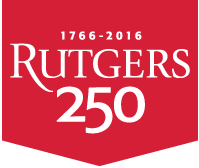
You are currently viewing the Legacy Physics Website. Click here to visit the updated Physics website..
This page can be found here
Graduate Program
Description of the graduate program
The graduate program in the Department of Physics and Astronomy is part of the Rutgers School of Graduate Studies. The program includes curricula leading to the degrees of Doctor of Philosophy (Ph.D.), Master of Science (M.S.), and Master of Science for Teachers (M.S.T ).
The Ph.D. curriculum
The doctoral program is designed to give students a broad understanding of classical and modern physics, with intensive training in one of the frontier areas of modern research. A thesis of original research is required to give the students experience in advancing themselves to the leading edge of an important area of physics. Students are encouraged to study several sub-disciplines of physics so that they will be prepared to apply their fundamental knowledge beyond the field of their thesis work.
An astronomy option is available that allows students who intend to carry out their thesis work in astronomy to replace several upper-division course requirements with astrophysics courses.
The average length of study is just under six years. In recent years, about three quarters of admitted Ph.D. students complete the full program of study and obtain a Ph.D. Most of those who do not obtain an M.S. degree before leaving the program.
A candidacy examination - also known as the Ph.D. qualifier - is ordinarily taken at the beginning of the second year. It includes writing a paper, presenting the material in a talk, and answering questions about the material presented.
The Master of Science is not required for the Ph.D. degree, nor are any foreign languages required.
A detailed description of degree requirements as well as summaries of individual faculty member research can be found in the current Handbook for physics graduate students ("Redbook")
Graduates of the doctoral program have been successful in diverse careers at universities, in government research laboratories, and in industry.
The M.S. curriculum
The master's programs provide attractive alternatives for students who wish to pursue a shorter advanced education program. Graduates of the M.S. degree program generally find careers in industrial laboratories or education. The program, requiring course work and either thesis research (at a much briefer level than that required for the Ph.D. degree) or a critical essay, is normally completed in two years. It is possible to obtain sooner if a student has already taken graduate courses before starting the program, and can transfer some credits. The M.S.T. degree program is primarily a subject-matter-oriented program for teachers. M.S. students often take the same core courses as the Ph.D. students during their first year, but this is not required. Courses can be chosen, in consultation with the program director or a faculty adviser, to fit individual needs.
Reports of broken links or other technical comments about this Web page should be reported to rgilman@physics.rutgers.edu. All correspondence about the Graduate Program in Physics and Astronomy should be addressed to graduate@physics.rutgers.edu.
Last revised Match 19, 2019
Find more about:
Jump to:
| Undergraduate Courses |
| Graduate Courses |
| Events Newsletter |
| Outreach Activities |
| Observatory Nights |
| Alumni & Friends |
| Alumni Newsletter |
